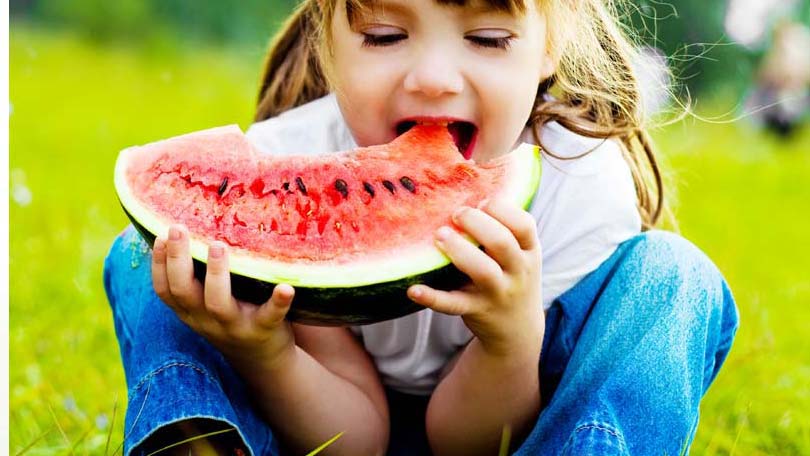
Fruits: your parents were probably always trying to get you to eat them instead of candy—and you may be fighting the same battle now with your own kids. It’s pretty clear that getting your kids to eat fruit instead of Mars Bars is a good move—fruits have many health benefits and are just as sweet as chocolate besides. Here are a few interesting facts you may not know about nature’s candy bars:
Apples: There’s something to that old saying about the apple a day keeping the doctor away. Apples are great for your health—not only do they contain healthy vitamins, they also contain antioxidants that reduce your risk for serious disease including cancer. They’re not high on Vitamin C—one of the better-known antioxidants—but they do contain other phytochemicals that perform a similar role in the body. Recent studies have suggested that chemicals found in apples prevents prostate cancer cell growth, reduces the risk of developing colon cancer by around 43%, and reduces chances of lung cancer growth by half. Make sure you eat the skin, though—that’s where most of the antioxidant activity comes from.
Pears: A single pear gives you 24% of the recommended daily dose of fiber. That’s good news for your intestinal tract, as a diet rich in fiber helps clean out your digestive tract. It’s also good news for your cholesterol levels. Pectin, a soluble fiber found in pears, binds to fatty materials in the intestines and gets them out more quickly—preventing the fat from being absorbed into your bloodstream. Pears are a good source of healthy carbs, too; their sugars are slow-dissolving and won’t overwhelm your pancreas with a big dump of sugar, like refined sugars found in candies do. Pears also contain 10% of your recommended daily dose of Vitamin C.
Bananas: Bananas contain potassium, which helps keep lactic acid from building up in your muscles. This means that if you eat bananas before a swim meet or big game, you’ll be able to go for longer before experiencing fatigue. It’s also a great source of Vitamin C, vitamin B6, and fiber.
Oranges: Just one single orange contains all the Vitamin C you need in a day. And Vitamin C is excellent for your health—it neutralizes free radicals in the body that can damage cells and initiate cancer growth. In places where cells replicate often, free radicals have more opportunity to damage DNA and start cancer growth—which is why preventing free radical damage prevents cancer. Free radicals also make it possible for cholesterol to stick to the walls of your arteries—so the more Vitamin C you take in, the better it is for your cholesterol level and the health of your circulatory system. In fact, evidence suggests that chemical compounds found in orange peels are as effective at lowering cholesterol as statin drugs.
Watermelons: Watermelons are an excellent source of anti-oxidants including Vitamin C, Vitamin A, beta-carotene, and lycopene. These neutralize free radicals in the blood, which improves cardiovascular health and helps lower the risk of all kinds of cancers. Lycopene is a particularly effective anti-oxidant, and watermelon is one of the best sources found in nature. The chemical actually gives watermelon its red color—some scientists even suggest that the redder the fruit, the higher its concentration of lycopene.
Kiwifruit: An average kiwifruit is about a third smaller than an average orange. But the kiwifruit is packed with more Vitamin C for its volume than a similar amount of orange. While kiwis provide only 95% of your daily allowance of Vitamin C—as opposed to an orange’s whopping 116%—the discrepancy is only due to the kiwi’s smaller size. Kiwis are excellent sources of Vitamin C and other antioxidants that lower your risk of cardiovascular disease and cancer. These chemicals also have other immune-system-boosting properties; in a study of Italian children aged between 6 and 7, the more kiwi the children ate, the less likely they were to experience respiratory problems.
Strawberries: If you want to lower your risk of cancer, look no further. Strawberries contain phytonutrients that pack a cancer-fighting punch. In one study, strawberries came in first of eight foods most likely to limit the risk of cancer deaths among a study group of 1,000 people. In fact, those who regularly eat strawberries were found to be three times less likely to develop cancer. A single serving of strawberries—about a cup—also provides a heavy dose of Vitamin C, at about 136.1% of your recommended daily allowance.
There’s no question that fruits are good for your health. Next time your sweet tooth starts getting you craving sugars, reach for the natural sugars found in strawberries, kiwis, oranges, apples, and other delicious fruits. You’ll satisfy your craving for sweets and promote your health at the same time—what’s not to like?
